Related Research Articles
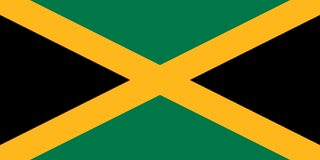
Jamaica is an island country in the Caribbean Sea and the West Indies. At 10,990 square kilometres (4,240 sq mi), it is the third-largest island—after Cuba and Hispaniola—of the Greater Antilles and the Caribbean. Jamaica lies about 145 km (78 nmi) south of Cuba, 191 km (103 nmi) west of Hispaniola, and 215 km (116 nmi) southeast of the Cayman Islands.
A trade union or labor union, often simply referred to as a union, is an organization of workers whose purpose is to maintain or improve the conditions of their employment, such as attaining better wages and benefits, improving working conditions, improving safety standards, establishing complaint procedures, developing rules governing status of employees and protecting and increasing the bargaining power of workers.
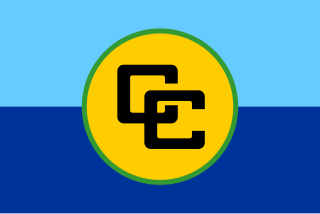
The Caribbean Community is an intergovernmental organisation that is a political and economic union of 15 member states and five associated members throughout the Americas, The Caribbean and Atlantic Ocean. It has the primary objective to promote economic integration and cooperation among its members, ensure that the benefits of integration are equitably shared, and coordinate foreign policy. The organisation was established in 1973, by its four founding members signing the Treaty of Chaguaramas. Its primary activities involve:
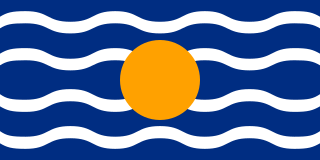
The West Indies Federation, also known as the West Indies, the Federation of the West Indies or the West Indian Federation, was a short-lived political union that existed from 3 January 1958 to 31 May 1962. Various islands in the Caribbean that were part of the British Empire, including Trinidad and Tobago, Barbados, Jamaica, and those on the Leeward and Windward Islands, came together to form the Federation, with its capital in Port of Spain, Trinidad and Tobago. The expressed intention of the Federation was to create a political unit that would become independent from Britain as a single state — possibly similar to Canada, the Federation of Australia, or the Federation of Rhodesia and Nyasaland. Before that could happen, the Federation collapsed due to internal political conflicts over how it would be governed or function viably. The formation of a West Indian Federation was encouraged by the United Kingdom, but also requested by pan-Caribbean nationalists.

The British West Indies (BWI) were the territories in the West Indies under British rule, including Anguilla, the Cayman Islands, the Turks and Caicos Islands, Montserrat, the British Virgin Islands, Bermuda, Antigua and Barbuda, the Bahamas, Barbados, Dominica, Grenada, Jamaica, Saint Kitts and Nevis, Saint Lucia, Saint Vincent and the Grenadines, British Honduras, British Guiana and Trinidad and Tobago.
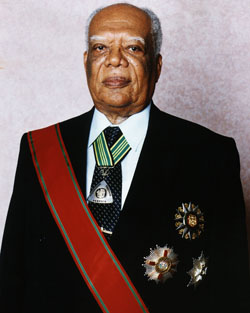
Sir Howard Felix Hanlan Cooke served as the fourth governor-general of Jamaica from 1 August 1991 to 15 February 2006.

The National Union of Teachers was a trade union for school teachers in England, Wales, the Channel Islands and the Isle of Man. It was a member of the Trades Union Congress. In March 2017, NUT members endorsed a proposed merger with the Association of Teachers and Lecturers to form a new union known as the National Education Union, which came into existence on 1 September 2017. The union recruited only qualified teachers and those training to be qualified teachers into membership and on dissolution had almost 400,000 members, making it the largest teachers' union in the United Kingdom.

There are long-established relationships between Canada and the many states of the Caribbean or West Indies. These ties have been on-going throughout the history of both regions. Initially these relations were based on the policies of European colonial powers in the Americas. More recently, both Canada and most of the Caribbean islands have achieved self-government, putting their relations into a different phase. CARICOM diplomats have referred to Canada as a '"special friend" of the Caribbean at the regional and bilateral levels.' Ties exist in such plurality of organs such as: the Commonwealth of Nations, the Organisation internationale de la Francophonie, Organization of American States, ParlAmericas, the United Nations, and the World Trade Organization.
The Bustamante Industrial Trade Union is a trade union center in Jamaica established by Sir Alexander Bustamante. The BITU was formed in 1938, as a split from the Jamaica Workers and Tradesmen's Union. It built up a membership of 54,000 within 6 years. It is affiliated to the International Union of Food, Agricultural, Hotel, Restaurant, Catering, Tobacco and Allied Workers' Association.

The NAHT is a trade union and professional association representing more than 49,000 members in England, Wales and Northern Ireland. Members hold leadership positions in early years; primary; special and secondary schools; independent schools; sixth form and FE colleges; outdoor education centres; pupil referral units, social services establishments and other educational settings.

The Modern Records Centre (MRC) is the specialist archive service of the University of Warwick in Coventry, England, located adjacent to the Central Campus Library. It was established in October 1973 and holds the world's largest archive collection on British industrial relations, as well as archives relating to many other aspects of British social, political and economic history.

Calabar High School is an all-male secondary school in Kingston, Jamaica. It was established by the Jamaica Baptist Union in 1912 for the children of Baptist ministers. It was named after the Kalabari Kingdom later anglicized by the British to Calabar, in present-day Nigeria. It has produced at least five Rhodes Scholars, and is respected for its outstanding performance in track and field.
The Caribbean Union of Teachers (CUT) is a federation of teaching trade unions in the Caribbean. Its affiliated unions are:
The Jamaica Association of Local Government Officers (JALGO) is a 5,000-member public sector trade union in Jamaica which represents workers in local and national government, governmental corporations, quasi-government bodies and other agencies created by statute. Its members are non-supervisory personnel and include fire-fighters with the Jamaica Fire Brigade, workers at the National Water Commission, non-nursing personnel in the health service, non-teachers in the schools, workers at the National Irrigation Commission and government employees in the 13 Parish Councils.

The Crown Colony of Jamaica and Dependencies was a British colony from 1655, when it was captured by the English Protectorate from the Spanish Empire. Jamaica became a British colony from 1707 and a Crown colony in 1866. The Colony was primarily used for sugarcane production, and experienced many slave rebellions over the course of British rule. Jamaica was granted independence in 1962.
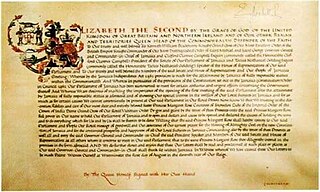
The Colony of Jamaica gained independence from the United Kingdom on 6 August 1962. In Jamaica, this date is celebrated as Independence Day, a national holiday.
The Jamaica Baptist Union is an association of Baptist Christian churches, affiliated with the Baptist World Alliance, founded in 1849 in Jamaica. The headquarters is in Kingston, Jamaica. The president of the union is Rev. Dr. Glenroy Lalor.
Edith Dalton-James MBE CD was a Jamaican educator and politician. She was a founding member of the People's National Party (1938), and the first woman to become president of the Jamaica Union of Teachers in 1949.
The Jamaica Teachers' Association (JTA) is a trade union representing education workers in Jamaica.
References
- 1 2 Alexander, Robert J. (2004). A History of Organized Labor in the English-Speaking West Indies. Westport, Connecticut: Praeger. ISBN 0275977439.
- ↑ "History of the JTA". Jamaica Teachers' Association. Retrieved 19 February 2023.